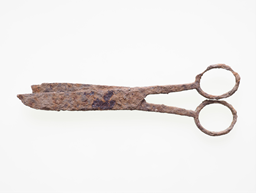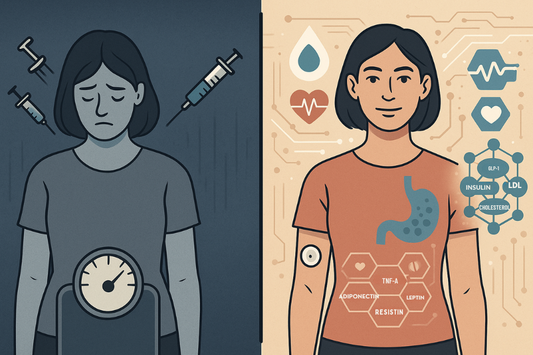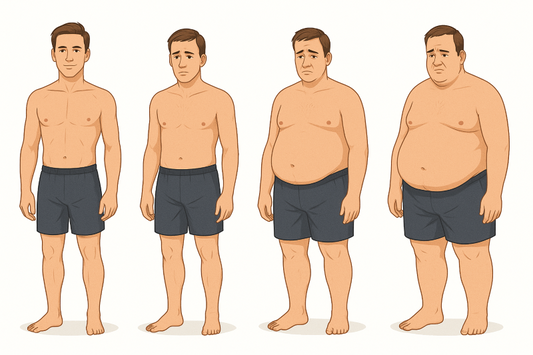Are you a worrier or a warrior? Are you super cool under pressure or do you struggle and become overwhelmed? Or maybe you are able to stay laser-focused on work for hours and your emotional experiences are felt deeply and in a prolonged manner.

Genes, to some extent, determine not only our behaviour, but also how we experience the world around us.
An important gene, COMT that has been studied in detail has been called the “worrier or warrior” gene due to the way it affects adrenaline in the body and dopamine levels in the brain.
The COMT gene, provides instructions for making an enzyme called COMT (catechol-O-methyltransferase). It is an enzyme that influences how readily we respond to stress, how long we feel the effects of stress, and how deeply we feel it. Too little stress and we struggle to get motivated to do anything. Too much stress can make us feel anxious and overwhelmed.
The warrior type has the ability to break down adrenaline and dopamine quickly and copes well in high stress situations, but may struggle with motivation and lower mood.
The worrier generally feels things more deeply and has higher levels of concentration, but is also more prone to becoming overwhelmed and anxious.
Knowing which you are allows you to address how you feel. There is a strong link between biochemistry and mental health – feeling stressed is indeed all in the mind. The mind is strongly influenced by the chemicals that are present in our brain, the levels at which they are present, and how quickly they are removed.
The speed at which we break down molecules like adrenaline and dopamine can vary by as much as 3-4 times depending on what type of gene and therefore enzyme you have.
Genes carry the blueprint for all sorts of structures in the body. In the case of COMT it has the instructions for telling the body how to make a pair of molecular scissors (an enzyme) that break down the following:
- Catecholamines: dopamine, adrenaline, and noradrenaline, which are neurotransmitters in the brain
- Oestrogen
Catecholamines do the molecular equivalent of half a dozen people running around your neighbourhood screaming FIRE FIRE!! They are chemical messengers that run around your body and prepare your physiology for ‘fight or flight’. Your senses become heightened, glucose floods your bloodstream, and your breathing increases as you anticipate the need to supply your muscles with lots of energy.
We need to turn off this response when danger has passed. COMT is the machine that does the dirty work of hunting and breaking down these whaling emergency signals (catecholamines) that have outstayed their welcome.
COMT stands for ‘catechol-O-methyltransferase’ (1)
Imagine a methyl is like taking a pair of scissors to the catecholamines. It causes them to break down. All of a sudden its name makes sense. COMT transfers a methyl group (pair of scissors) to the class of molecules called catecholamines.
The two versions of COMT
There is a slow and a fast version of COMT – think of them a rusty scissors and sharp scissors respectively. The slow COMT is found in about 20-30% of caucasian Europeans. It means the enzyme works about 3-4 times slower than the fast version.
A slower action means slower removal of dopamine and cortisol, which means emotions, positive or negative, are felt more strongly (2).
It is also important to understand that mutations (changes) can gather on genes and slow down the protein (molecular machine) they make. This is natural evolution, sometimes these mutations are advantageous some times they are not.
Conversely epigenetic changes (how your behaviours and environment can cause changes that affect the way your genes work) can also gather on genes and speed them up.
Epigenetics
Epigenetics is a bit like a volume knob on a gene that can be turned up and down. A “slow” gene can be sped up in response to the environment and a “fast” gene can be slowed down. This is done by adding an epigenetic tag in the form of a chemical methyl group.
These epigenetic changes can even be passed on through generations! Researchers showed how the environment affected epigenetics in the Dutch famine of 1944-45. Children who were born to mothers who were exposed to famine conditions had higher rates of obesity and heart disease. Those who had not experienced it were barely affected (6).
This has knock-on downstream effects for the following:
- Brain chemistry
- Stress
- Addiction
- Sensitivity to coffee
- Menstrual cycle issues
- Some cancers
Brain chemistry
When it comes to brain chemistry it’s all about balance. Each brain messaging chemical has a ‘goldilocks zone’, a certain level where it’s helpful and aids function, but beyond which it impedes it. Think of it as like a music mixing board: only when the volume dials slide in the right combinations does beautiful music emerge. In your brain it’s only when messaging chemicals are at the right levels that clarity of thought emerges.

As we experience the world these brain chemicals oscillate within predefined parameters.
And this in turn impacts how we think and feel.
| Scissors type: | Worriers have rusty scissors that can be 3-5 x less efficient | Warriors have sharp scissors and can efficiently clear dopamine levels |
| Advantage: | Thrive in low stress and complex environments that require memory and attention | Feel calm in stressful environments |
| Disadvantage: | Can get overwhelmed in stressed environments | Can get bored with menial tasks |
Stress
COMT breaks down two key stress neurotransmitters called adrenaline and noradrenaline. If you are dealing with danger or an intense situation you want their levels to be high. This sharpens your mind and prepares your body to deal with the challenge.
Worriers (slow COMT / rusty scissors) find it hard to break down rising levels of stress signals (adrenaline and noradrenaline), leading to intense focused work, but also higher levels of stress and anxiety. They also find it harder to sleep.
Warriors (fast COMT / sharp scissors) easily wipe away stress signals from their body, allowing them to stay more calm in stressful situations. This comes at the cost of finding it harder to concentrate and hype themselves up for work.
Addiction and happiness
Dopamine is the ‘happiness’ chemical your brain just loves. It is released when you eat great food, have just received excellent news, and even when you take recreational drugs. Dopamine is the primary molecule that makes your brain want to chase and repeat those happy experiences.
Warriors inevitably have lower levels of dopamine as it’s broken down quicker. This leaves warriors more at risk of depression and addictive behaviour like gambling because they’re always trying to spike relatively low dopamine levels.
Excessively high dopamine levels can cause agitation and irritability, making you respond poorly to stress.
Sensitivity to coffee
Coffee is classed as a catechol, a class of molecules broken down by COMT. Those worriers with slower rustier COMT inevitably are slower at breaking down caffeine. Therefore, you are more sensitive to coffee’s effects, which adds to your sleep problems.
Impact on hormones
COMT is also important for breaking down hormones like oestrogen. In both men and women oestrogen is important in building muscle and bone in a healthy way. It is also essential for heart, skin, and mental health.
Like neurotransmitters, hormones are powerful messengers that turn body functions on and off. Sometimes we need them at high levels and sometimes we need them at lower levels, so the ability to switch between the two levels quickly is important.
Oestrogen
Oestrogen is a sex hormone. Although found at higher levels in females it is also important in males. Its levels rise and fall over the month and regulate the female menstrual cycle.
HOWEVER…
High oestrogen levels can cause problems such as premenstrual syndrome and menstrual cycle issues, as well as fibroids and an increased risk of female cancers. In females a slow COMT can mean high levels of oestrogen and its breakdown products. This is linked to PCOS, fibroids, and heavy menstruation as well as breast cancer. Oestrogen is a hormone that tells the body “to build” and if this signal is constantly “too strong” an overgrowth of cells can cause problems.
What can I do to change my COMT?
The advice is broken down into:
- For everyone
- For worriers (slow COMT)
- For warriors (fast COMT)
There is a biochemical system that sits behind COMT called the methylation cycle. Improving this system improves how well COMT works.
By ensuring that the biochemical pathway has everything it needs to work properly (like an efficient supply chain) reduces the chances of bottlenecks. By making sure that the COMT is not having to work too hard will also help.
No matter what form it comes in, the following micronutrients are essential to make sure it runs smoothly:
- Vitamin B2
- Vitamin B6, because it is the rate-limiting cofactor for dopamine synthesis (via when the AAAD enzyme converts L-DOPA to dopamine). Note that there is a difference in active and non-active B6, the former being the one you want, also known as PLP or PDP vitamin B6.
- Vitamin B9 with the active form known as methyl-folate
- Vitamin B12
The COMT enzyme also needs a magnesium ion to work properly, so make sure you also get that in. Note that caffeine blocks the uptake of magnesium from the diet. So if you’re a coffee lover make sure you get your magnesium supplements.
Try to lower your body fat. Fat tissue creates extra oestrogen, making it harder for COMT to balance oestrogen levels correctly.
Try meditation: it’s been scientifically proven to lower stress levels, including your stress neurotransmitters if you’re a slow COMT. Or it can help you to focus (if you are a fast COMT)
What worriers can do
You get stressed out more easily, so keep a mindful eye on your stress levels throughout the day.
“A slow COMT makes stress feel stronger and last longer.”
You’re a bit of a workaholic and are more at risk of burnout, so make sure you take all your breaks, days off, and vacations. Even though you may want to push the boundaries, remember success and achievement is a long term game and breaks allow you to perform optimally over the long term.
You are full of energy, so do exercise to burn it off and clear those neurotransmitters.
Be mindful of caffeine. It’ll affect you more. If you’re finding it hard to go to sleep or feeling anxious or irritable, try to lay it off for a while.
Supplements and food which will help and those to avoid:
Supplements:
- Active B vitamins: B2,6,9, 12. See our Super B complex in the supplements section
- Magnesium glycinate: COMT needs magnesium and glycine helps to calm the brain
- DIM can help with eliminating oestrogen efficiently.
Food:
- Eat protein in the morning, less at lunch, and as little as possible in the evening. Protein that has high amounts of the amino acids tyrosine and tryptophan increases dopamine and catechols, which your COMT may struggle to deal with.
- Eat foods that help with removing catechol oestrogen metabolites. Cruciferous vegetables like cabbage and broccoli all help.
- Phytonutrients you can eat (as they don’t have a catechol structure). For example, grapefruit, chamomile, onions, parsley and celery.
Things to avoid:
Some phytonutrients also contain catechols and so a high consumption of these will also overburden a slow COMT gene.
- Green tea, EGCG and foods like capers, coriander, berries and apples all have high levels of catechols and so can make work for the COMT gene leaving less capacity to break down neurotransmitters and oestrogen.
- Dairy, parabens and xenoestrogens are all oestrogen boosters that will make things worse so best avoided.
What warriors can do
Eat more protein. The biochemical pathway that produces neurotransmitters relies on you eating protein. So if you’re risking low levels, making sure you optimise your production of neurotransmitters like dopamine and adrenaline is a good idea. Specifically, phenylalanine and tyrosine are two amino acids that act as precursors to build catecholamines. Ensure you’re getting at least 50 grams of protein a day (3).
Sleep more – it helps you make the neurotransmitters you may be deficient in.
Find a way to boost dopamine in non-addictive ways . Find activities that engage your brain like dancing, playing sports etc…
Human contact like hugs are known to raise dopamine levels. Studies show you need to hug for 20 seconds to get the maximum amount of benefit.
Summary
The COMT gene is a well studied gene with 3,242 published studies in the National Library of Medicine. It has a profound effect on mental health as it plays such a key role in the neurotransmitters that affect how we experience life and how deeply we experience it.
Both slow and fast have their advantages and disadvantages. It is however the slow COMT / worriers that are at higher risk of health issues. It is possible to help your slow COMT work better by not overburdening it and making sure that it can work properly. A diet high in green cruciferous vegetables, magnesium and B vitamins is essential. Stopping your body from producing too much adrenaline in the first place by mindful practices will help keep you more balanced.
References
- COMT catechol-O-methyltransferase [Homo sapiens (human)] – Gene – NCBI. 2020. Nih.gov. https://www.ncbi.nlm.nih.gov/gene/1312.
- KEGG PATHWAY Database. 2019. Genome.jp. https://www.genome.jp/kegg/pathway.html.
- Complexity of dopamine metabolism. Cell Communication and Signaling, 2013. 11(1): 34. Meiser, J., Weindl, D., & Hiller, K. 2013.
- Vitamin C function in the brain: vital role of the ascorbate transporter SVCT2 2009. Free Radical Biology and Medicine, 46(6): 719–730. Harrison, F. E., & May, J. M.
- Crystal Structures of Human 108V and 108M Catechol O-Methyltransferase. Journal of Molecular Biology, (2008) 380(1), pp.120–130. Rutherford, K., Le Trong, I., Stenkamp, R.E. and Parson, W.W.
- Persistent epigenetic differences associated with prenatal exposure to famine in humans Bastiaan T Heijmans 1, Elmar W Tobi, Aryeh D Stein, Hein Putter, Gerard J Blauw, Ezra S Susser, P Eline Slagboom, L H Lumey Proc Natl Acad Sci U S A. 2008 Nov 4;105(44):17046-9








